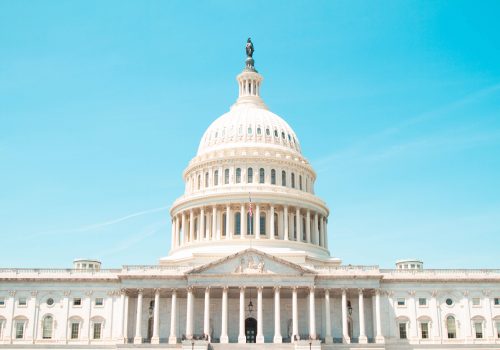Congressional Hearing – “Life Under Occupation: The State of Human Rights in Crimea”
Statement
I would like to thank Chairman Hastings and the other members of the Commission for the opportunity to speak today. After Russia illegally annexed Crimea in 2014, the Atlantic Council set up its Ukraine-in-Europe initiative to press the West to support Ukraine against Russian aggression and urge Kyiv to follow through on its reform pledges. Drawing attention to Crimea and the ongoing human rights catastrophe there remains an important part of our work. Unfortunately, Crimea hardly gets any attention today, so thank you Mr. Chairman, for your leadership on this vital issue.
The human rights situation in Russian-occupied Crimea is acute and merits a hearing as a stand-alone issue. But what happens in Crimea has significance that goes beyond the plight of the two million people who live there. What happens in Crimea may not stay in Crimea. What Moscow is learning in Crimea is how to apply a range of oppressive and coercive tactics to minorities it perceives as hostile or of questionable loyalty. These insights could be applied elsewhere in Russia, which is home to considerable non-Russian minority populations. How the US government reacts to the ongoing abuses in Crimea will undoubtedly factor into Moscow’s calculus on comparable situations in the future.
The picture in Crimea is grim. It is no exaggeration to say that the peninsula is becoming a police state. Crimea, once the pearl of the Black Sea and a primo vacation destination, is bereft of tourists, cut off from the rest of the world without any access to independent media, and a place where the occupying authorities use children to spy on their parents.
The media is controlled by the government. Independent media sources are forbidden and have been blocked and barred from the peninsula. Ukrainian journalists and photographers are not allowed to visit Crimea, and freelance journalists residing in Crimea have been charged with involvement in terrorism for simply reporting stories.
According to Human Rights Watch, the free press that acts as a lifeline between Crimea and the rest of the world is in grave danger of being severed. Last week, Taras Ibragimov, one of Crimea’s independent journalists, was banned from entering the peninsula on bogus charges that he was a threat to state security. He has been banned from entering for 34 years. His crime? He told the world about the occupying authorities’ widespread and violent abuse of minorities in Crimea.
The good news is that the US government worked quickly to stand up an excellent independent source of online information that is flourishing. Within three months of Russia’s 2014 annexation of Crimea, RFE/RL’s Ukrainian Service launched Crimea.Realities, a website dedicated to developments on the peninsula published in Russian, Ukrainian, and Crimean Tatar. It is the top-ranked news source on Crimea, with approximately 2.4 million visits per month in 2019. Its videos on YouTube received a monthly average of 2.3 million views in 2019. In September 2017, in partnership with Radio of Crimean Communities, Crimea.Realities launched a 24/7 FM radio broadcast stream for northern and eastern Crimea, with Russian- and Ukrainian-language content from RFE/RL and Ukraine’s Hromadske Radio.
Religious freedom is also a serious concern. The Ukrainian Orthodox Church is forbidden in Crimea, and Crimean Tatars are routinely interrogated after Friday prayers.
Another area of concern is education and language rights. Education programs and textbooks have been rewritten to emphasize that Crimea had always been part of Russia and has in fact been rightfully returned. In addition, education has been Russified; classes held in Ukrainian and Crimean Tatar have been dropped. Military preparation classes have become obligatory for students.
The occupying authorities have used political persecutions to establish fear and force those who disagree with annexation, namely Crimean Tatars and Ukrainians, to flee. Since annexation, 50,000 people, including more than 25,000 Crimean Tatars, have fled Crimea. People are leaving the peninsula because their secondary or higher education degrees are not recognized, they want to avoid the Russian army draft, and unemployment on the peninsula is high. Activists report that civil servants of every level have been replaced by Russians who moved to the peninsula after annexation. Approximately 500,000 Russians have moved to Crimea since 2014, primarily military personnel and civil servants. Activists report that among those who moved to Crimea from Russia, a majority are military and special forces.
The situation is getting worse. According to the Crimean Tatar Resource Center, the number of politically motivated arrests has increased nine-fold from 2017 to 2019. One hundred Crimean political prisoners are being held in Russian prisons and have not been released or exchanged since 2014.
The FSB is doing its best to stamp out any dissenting thought. Up to 200,000 people have been approached, intimidated or interrogated by the FSB within the last six years of occupation, according to local activists. The FSB and Russian special forces use various intimidation tactics to create the greatest psychological damage, to create a climate of fear, and to signal to the pro-Ukrainian resistance that resistance is futile. Tactics include breaking into the peaceful homes of Crimean Tatar activists in full special forces gear, brandishing automatic weapons and grenades, entering apartments from the roof, and breaking windows between 4 to 6 am while children are sleeping.
Russia has effectively turned Crimea into a Russian military base. The Soviet Union’s bases on the peninsula have been restored, and anti-aircraft missile systems now line Crimea’s perimeter. Additionally, the Russian government may have placed nuclear weapons in Crimea. In 2018, independent Russian military analyst Pavel Felgenhauer warned that the Russians have placed nuclear weapons in Crimea because of the presence of nuclear-capable delivery systems, although Moscow will not confirm or deny the presence of nuclear weapons there.
Perhaps most troubling are reports that the state is using its security services to encourage ordinary people to spy on their neighbors and families. Activists say that the security services are working with schoolteachers, students, civil servants, and other administrative platforms to encourage people to report any misbehavior, which includes comments and meetings. These reports are used as a basis for arrests and fake charges. The FSB is also spying on all pro-Ukrainian sentiment on social media.
Crimea is becoming a police state before our very eyes, and the West knows very little. No international monitoring of human rights has taken place in Crimea since 2014; the United Nations and the Organization for Security and Co-operation in Europe have a mandate to monitor human rights in Ukraine and Crimea, but the Kremlin has successfully blocked them, sometimes at gunpoint, from entering the peninsula.
Some may dismiss the fate of two million people as essentially a specialist issue. However, what happens in Crimea may not stay in Crimea. The Kremlin may be testing some of its most authoritarian tactics in Crimea before enacting them elsewhere. In Crimea, Moscow is testing and refining in a non-war situation coercive and repressive approaches to minorities it views as questionable or hostile.
Thus, what happens in Crimea may not stay in Crimea. The fate of the Crimean Peninsula is not a boutique issue, but one of vital importance to anyone who cares about Russia as well.
Given these challenges, what should the US government do?
The most important action the US government can do is continue to speak out unambiguously. Crimea is Ukraine, full stop. Secretary of State Mike Pompeo’s 2018 Crimea Declaration was spot on. Pompeo stated that the United States refuses to recognize the Kremlin’s claims over Crimea and pledges to maintain this policy until Ukraine’s territorial integrity is restored. The US will not lift sanctions until Crimea is returned to Ukraine.
But we must be realistic about the timeframe and play the long game. The Russians will not leave Crimea anytime soon. President Volodymyr Zelenskyy refreshingly admitted that he does not know how Ukraine will get Crimea back. But there is a helpful historical precedent that we can point to: in the Baltics, it took fifty years for Estonia, Latvia, and Lithuania to throw off the yoke of Soviet occupation. They did it eventually, and today they are flourishing. Crimea can, too.
The US government should continue to invest heavily in Radio Free Europe/Radio Liberty’s Crimean Tatar service. This is a lifeline that keeps the people of Crimea from being cut off from the larger world.
Congress should continue to pass resolutions condemning Russia’s illegal annexation and recognizing the terrible human rights situation in Crimea.
The United States should support cultural, religious, and educational institutions in Ukraine that operate outside of Crimea but support resistance to Russian occupation there.
The US government should start a scholarship program specifically to train Crimean Tatar and Ukrainian journalists at Columbia School of Journalism, so that reportage from Crimea becomes a mainstream part of US and Ukrainian coverage.
Thank you, Mr. Chairman, for this opportunity, and let me express my gratitude to Ukrainian MP Rustem Umerov, a member of the Crimean Tatar community and parliament of Ukraine, and my colleague Doug Klain for their invaluable assistance in preparing this testimony.
Melinda Haring is the deputy director of the Atlantic Council’s Eurasia Center.
Related experts
Related testimony

The Eurasia Center’s mission is to promote policies that strengthen stability, democratic values, and prosperity in Eurasia, from Eastern Europe in the West to the Caucasus, Russia, and Central Asia in the East.
Image: Left to right: Representative Alcee L. Hastings (D-FL), Oleg Sentsov, Melinda Haring, and Representative Marc Veasey (D-TX). Photo Credit: Commission for Security and Cooperation in Europe.

